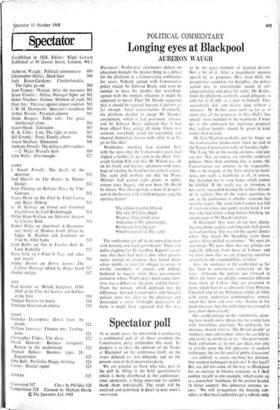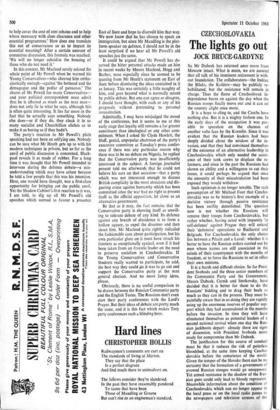Longing eyes at Blackpool
POLITICAL COMMENTARY AL BERON WAUGH
Blackpool—Wednesday afternoon's debate on education brought the nearest thing to a defeat for the platform at a Conservative conference for years. Nobody agreed with Conservative policy except Sir Edward Boyle, and even he seemed to have his doubts; but everybody agreed with the motion, whatever it might be supposed to mean. Then Mr Maude suggested that it should be rejected because it did not go far enough. Total consternation. Eventually, the platform decided to accept Mr Maude's amendment, which it had previously refused, and Sir Edward Boyle declared that it had been official Tory policy all along. Unity was restored, everybody voted for everything and cheered themselves hoarse with relief. Can life go on like this?
Wednesday morning had dawned here with the news that the Conservative party had slipped a further 21 per cent in the Daily Tele- graph Gallup Poll and that Mr Wilson was off on his frank and fearless adventure with every hope of stealing the headlines for at least a week. The same poll pointed out that the Prime Minister had gained eight points in public esteem since August, and now beats Mr Heath by eleven. Was there perhaps a note of despera- tion in the fervour with which delegates saint the opening hymn?
`Thy kingdom come, 0 God, Thy rule, 0 Christ, begin We pray Thee, Lord, arise. And come in Thy great might; Revive our longing eyes Which languish for Thy sight.'
The conference got off to an unexciting start with housing and local government. There was polite clapping for Mr Geoffrey Rippon's assur- ance that there had been a time when govern- ments elected on promises they found them- selves unable to keep felt obliged to resign. A worthy sentiment, of course, and nobody bothered to inquire when these governments existed or where. Wednesday's main event, how- ever, was a debate on 'the party and the future.' From the motion, which deplored that the differences between Conservative and Socialist policies were not clear to the electorate and demanded a more forthright declaration of them, it might have appeared that this was
to be the great moment of licensed dissent. Not a bit of it. After a magnificent opening speech by its proposer, Miss Joan Hall, the prospective candidate for Keighley, the debate
settled into its interminable round of self- congratulation and pleas for unity. Mr Barber, from the platform, earnestly asked delegates to vote for it, if only as a spur to himself. They accordingly did, and dissent died without a whimper. Mr Barber even went so far as to claim that all the proposals in Miss Hall's 'fine speech' were included in the manifesto. I'won- der if this embraced her ingenious proposal that welfare benefits should be given in kind rather than in cash.
Mr lain Macleod probably put his finger on the Conservative predicament when he said to the Young Conservative rally on Tuesday night; `The Tariq Alis of this world are news, and you are not.' Nor, of course, are sensible, moderate policies. More than anything else, it seems, the Conservatives are anxious to be respectable. This is the tragedy of the Tory mid-term mani- festo. not really a manifesto at all, of course, but 'designed not to raise hopes which cannot be fulfilled.' If this really was its intention, it has surely succeeded beyond the wildest dreams of its authors. One of the rudest questions to ask at the conference is whether someone his actually read it. The train from London was full of representatives and agents trying hard. I saw two who had fallen asleep before finishing the second page of Mr Heath's preface.
At Blackpool, they were all too busy chang- ing into dinner jactets and long tulle ball gOVvriS to read anything. This was for the agents' dinner where they heard Mr Maudling warn them .„ against being pushed to extremes: 'We must do two things. We must show that our policies are • radically different from those of Labour; and we must show that we are preparing ourselves seriously for the responsibilities of office.'
Alas, the tendency at the conference so far has been to concentrate exclusively on the latter. Although the policies put forward in Make life better• are plainly somewhat different from those of Labour they are presented in terms which borrow so obviously from Winston Churchill and all the Wilsonian cliches of 1964, with every pedestrian commonplace remark which has been said ever since thrown in for good measure, that the conference has ceased to care about them already.
One could enlarge on this indefinitely, show- ing how nearly every phrase hit the wrong note with marvellous precision. No politician, for instance, should refer to 'The British people' or `ordinary men and women' unless he can help it, and never, in antithesis to `us'—the government. Such aspirations as `to test our ideas, not only in private using the full apparatus of modern techniques, but on the anvil of public discussion' —are unlikely to excite anything but derision. Our modern techniques in private? Is this legal?' But one did not come all the way to Blackpool for an exercise in literary criticism, so I shall confine myself to one example, which came up at a journalists' luncheon. In the section headed `A better country' this immortal sentence oc- curs: 'We will re-negotiate the housing subs sidies, so that local authorities get a subsidy only
to help cover the cost of rent rebates and to help where necessary with slum clearance and other essential programmes.' How does one translate this out of conservatese so as to impart its essential meaning? After a certain amount of committee discussion, this formula was reached: 'We will no longer subsidise the housing of those who do not need it.'
In this context, Mr Macleod surely missed the whole point of Mr Powell when he warned his Young Conservatives—who cheered him enthu- siastically enough—against 'the hothead and the demagogue and the pedlar of panaceas.' The charm of Mr Powell for many Conservatives— and your political correspondent must admit that he is affected as much as the next man— does not only lie in what he says, although this is often quite interesting. It lies far more in the fact that he actually says something. Nobody else does—or if they do, they cloak it in so many socialist and Churchillian clichés as to make it as boring as if they hadn't.
The party's reaction to Mr Powell's plain speaking had not been an edifying one. Nobody can be sure what Mr Heath gets up to with his modern techniques in private, but so far as the anvil of public discussion is concerned, Black- pool reveals it as made of rubber. For a long time it was thought that Mr Powell intended to intervene during the defence debate—a mis- understanding which may have arisen because he told a few people that this was his intention. Here, one would have thought, was a first-class opportunity for bringing out the public anvil. Yet the Shadow Cabinet's first reaction to it was, I am told, to dig up all Mr Powell's old speeches which seemed to favour a presence East of Suez and hope to discredit him that way. We now know that he has chosen to speak on immigration, but since Mr Maudling is the plat- form speaker on defence, I should not be in the least surprised if we hear all Mr Powell's old speeches just the same.
It could be argued that Mr Powell has de- served the bitter personal attacks made on him in recent weeks by Messrs Macleod, Hogg and
Barber, most especially since he seemed to be quoting from Mr Heath's statement on East of Suez before dismissing the ideas contained in it as lunacy. This was certainly a little naughty of him, and goes beyond what is normally meant by public debate. But one can agree or disagree, I should have thought, with each or any of his proposals without pretending to personal assassination.
Admittedly, I may have misjudged the mood of the conference, but it seems to me at this early stage that loyalty still remains a far greater constituent than ideological or any other com- mitment. When I asked Sir Clyde Hewlett, the bluff, genial, unpopular chairman of the party's executive committee at Tuesday's press confer- ence if there was any particular reason why there was to be no debate on Nigeria, he replied that the Conservative party was insufficiently interested in the subject. A foreign journalist present told me afterwards that he could not believe his ears on that occasion—that a party which was not interested enough to discuss British complicity in the most atrocious and dis- gusting crime against humanity which has been committed since the war had no right to present itself as the official opposition, let alone as an alternative government.
Be that as it may, the fact remains that the Conservative party is showing itself as unwill- ing to tolerate debate of any kind. Its defence against any breath of dissidence is to form a hollow square, to expel the dissenter and then shoot him. Mr Macleod quite rightly ridiculed the fashionable cant about participation, but his own particular gloss on it must have struck his listeners as exceptionally cynical, even if it had been taken from an Izvestia leader on the need to preserve socialism in Czechoslovakia. If the Young Conservatives and Conservative Students really wanted to participate, he said, the best way they could do it was to go out and support the Conservative party at the next general election. And no more fancy ideas, please.
Obviously, there is no useful comparison to be drawn between the Russian Communist party and the English Tories. The Russians don't even start their party conferences with the Lord's Prayer. But their ideas of debate are pretty much the same, and it is this fact which makes Tory party conferences such a blinding bore.







































 Previous page
Previous page